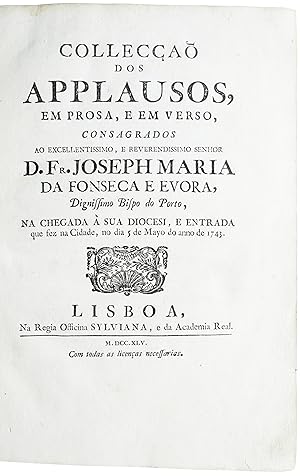About this Item
Folio (28.5 x 20.4 cm.), Contemporary sheep (some scraping and other minor wear) spine richly gilt with raised bands in six compartments (lacquered), crimson leather lettering piece (lower portion defective) in second compartment from head, text block edges sprinkled red. Nicely printed on thick, high quality paper. Woodcut vignette on title page. In very good condition. Internally fine, with ample margins. (10 ll.), 371 pp. Page 243 wrongly numbered 143; p. 339 wrongly numbered 393. *** FIRST and ONLY EDITION of this rare work on the ceremonies that took place in Porto on the occasion of the entrance of the new Bishop. This work is rare, perhaps due to some positive mentions of Jesuits, and a letter praising the Bishop from a Jesuit in Rome. After the suppression of the Jesuit Order, the all-powerful Marquês de Pombal probably looked askance at such texts. Due to the subject matter, and the quality of the printing, the book may have been produced in a small edition.Pages 25-8 contain a three-page description of the procession, indicating the order of arrivals, number of horses, clothing worn by distinguished guests, and decoration on the horses, following an account of the Bishop's entrance on pp. 1-25. A letter sent from Rome by the Jesuit Father Alexandre Duarte occupies pp. 35-52. António de Deos Campos provided text for a panegyric and dialogue between Rome and Évora (pp. 53-118); the future author of the Compendio geral da historia da veneravel Ordem terceira de S. Francisco . (1752), Fr. Manoel de Oliveira Ferreira (pp. 119-154) is the author of poems including an acrostic sonnet (p. 132) and "Enigma: Estrellas, Mitras, sem Bago" (pp. 144-5); in addition to writing in Portuguese, he includes some neo-Latin verses, and one poem in Italian; at the end of the volume (pp. 303-371) comes a long neo-Latin laudatory poem by him, preceded by a neo-Latin prose argument. Joseph Carlos Pinto de Azevedo provides several poems (pp. 155-62). Especially fascinating are concrete poems by Manoel Ferreira Leonardo called labyrinthos (or "labyrinths" on pp. 163-71. Martinho Lopes de Moraes Alão, canon of the Porto cathedral, writes a poema historico-panegyrico in honor of the city of Porto (pp. 173-214). Thomás António de Noronha e Menezes (pp. 215-36) provides a long "Metrica narração heroica da magnifica, e triunfal entrada, que a 6 de Mayo deste anno de 1743, fez ." followed by a sonnet and five decimas. An anonymous "Relação poetica, lyrica, jocoseiria ." is to be found on pp. 237-46. A neo-Latin panegyric oration by P. Josepho de Sampayo can be found on pp. 247-80. Luiz de Sousa de Mendoça provides neo-Latin epigrams (pp. 281-300); while Fr. Salvador da Guia (pp. 301-302) gives a neo-Latin elogy.Unnumbered preliminary leaves 3 verso to 4 verso contain a Censura do Ordinario by Diogo Barbosa Machado dated 2 May 1744 which heaps lavish praise on this volume and its subject.D. Frei José Maria da Fonseca e Évora (Évora, 1690-Porto, 1752), Franciscan prelate, whose secular name was José Ribeiro da Fonseca de Figueiredo e Sousa, received a degree of Master of Arts from the University of Évora, and another in canon law from Coimbra. He accompanied the Marquês de Fontes on his ambassadorial mission to Rome in 1712. While in Rome he entered the Franciscan order, for which he eventually performed numerous important functions, as well as occupying diplomatic and political positions. He participated in several Academies, including the Academia Real da História Portuguesa. D. João V chose him to be Bishop of Porto in 1739, a post he accepted after having refused various bishoprics in Italy, and which he occupied with dignity for the rest of his life.*** Santa Casa da Misericórdia de Lisboa, Catálogo das obras impressas no século XVIII, 203. For D. José Maria da Fonseca e Évora, see Barbosa Machado II, 868-72; IV, 216 (the present work not mentioned); Innocêncio XIII, 95 (the present work not mentioned); Grande enciclopédia XI, 573-4. For P. Manue. Seller Inventory # 42532
Contact seller
Report this item
![]()




